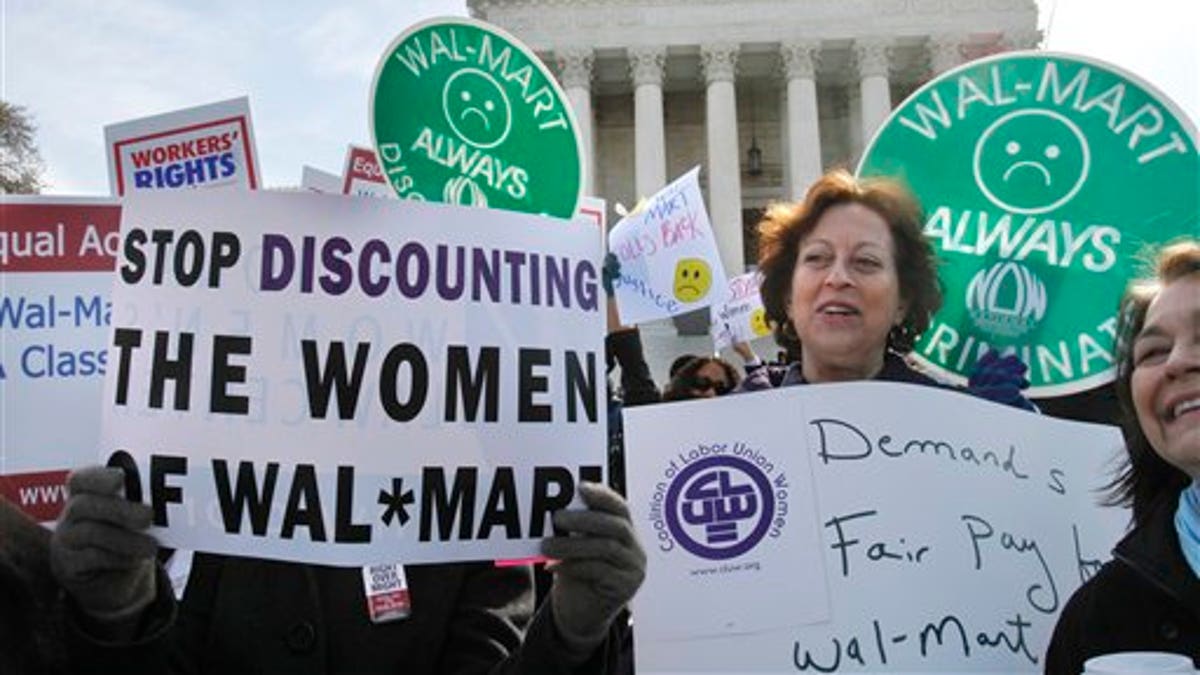
March 30: Protestors rally outside the Supreme Court in Washington, supporting plaintiffs in a case of women employees against Walmart. (AP)
The largest employee class-action lawsuit in U.S. history will not go forward, the Supreme Court ruled Monday, marking a major victory for Wal-Mart Stores while frustrating the plaintiffs, who were trying to include as many as 1.6 million female in the sex discrimination case.
The court agreed unanimously that the litigation could not proceed as a class action in its current form, reversing a decision by the 9th U.S. Circuit Court of Appeals in San Francisco. The court split along 5-4 lines over whether the group presented a common claim in seeking an injunction that would have forced the retailer to change its employment practices.
Justice Antonin Scalia wrote the court's opinion, blocking what he called "one of the most expansive class actions ever" to have been green-lighted by lower courts.
Plaintiffs "wish to sue about literally millions of employment decisions at once," Scalia wrote. "Without some glue holding the alleged reasons for all those decisions together, it will be impossible to say that examination of all the class members' claims for relief will produce a common answer to the crucial question why was I disfavored."
The case was worth potentially billions of dollars in damages, and the split court immediately set off the litigants in the case.
"Wal-Mart has had strong policies against discrimination for many years," company vice president Gisel Ruiz said in a statement. “The court today unanimously rejected class certification and, as the majority made clear, the plaintiffs' claims were worlds away from showing a companywide discriminatory pay and promotion policy."
"The court's ruling erects substantially higher barriers for working women and men to vindicate rights to be free from employment discrimination," the plaintiffs said in a statement after the decision.
Sen. Patrick Leahy, D-Vt., chairman of the Senate Judiciary Committee, also took exception to the court's composition, suggesting that the ruling shows that "an activist majority of the Supreme Court is making it more and more difficult for any American to have their day in court."
"This is not an isolated case. It is the latest in a series of cases the Judiciary Committee has considered over the last four years," Leahy said in a statement. "Over the past two years, the American people have grown frustrated with the notion that some corporations are too big to fail. Today's decision will undoubtedly make some wonder whether the Supreme Court has now decided that some corporations are too big to be held accountable."
The case started a decade ago when Betty Dukes said the management at the Pittsburg, Calif., Walmart store where she worked was bypassing her for promotions. "I could see the men going forth and the women in the store stayed in the basic positions they were always in," Dukes once told an interviewer.
Dukes' discrimination claims were folded into a class-action lawsuit covering all current female Wal-Mart employees and any who worked for the company going back to late 1998.
In a conference call with reporters after Monday's ruling, Dukes said she was disappointed in the ruling, but added "we will persevere even though we didn't get the ruling we hoped for."
Lawyer Joseph Sellers said the ruling reverses 40 years of court decisions and raises the hurdles that workers have to clear to file discrimination claims. He emphasized that the decision made no judgment on whether the company discriminated against its female workers and that he's "determined to proceed" on behalf of his clients. This could be through scores of individual lawsuits against Wal-Mart or smaller class-action claims.
Justice Ruth Bader Ginsburg led the four-member dissent saying the court's holding "disqualifies the class at the starting gate" for putting too much of a burden on the plaintiffs to show how their individual claims are sufficiently similar to form a class-action suit.
"The 'dissimilarities' approach leads the court to train its attention on what distinguishes individual class members, rather than on what unites them," Ginsburg wrote and was joined by Justices Stephen Breyer, Sonia Sotomayor and Elena Kagan.
But the U.S. Chamber of Commerce, which filed an amicus brief on behalf of Wal-Mart, said the unanimity of the case came when all the justices agreed that the lower court "radically lowered the standard for certifying class actions."
"Too often the class-action device is twisted and abused to force businesses to choose between settling meritless lawsuits or potentially facing financial ruin. Our economy would be better served if businesses could spend more resources creating jobs and fewer resources fighting frivolous litigation," said Robin Conrad, executive vice president of the U.S. Chamber of Commerce's National Chamber Litigation Center.




